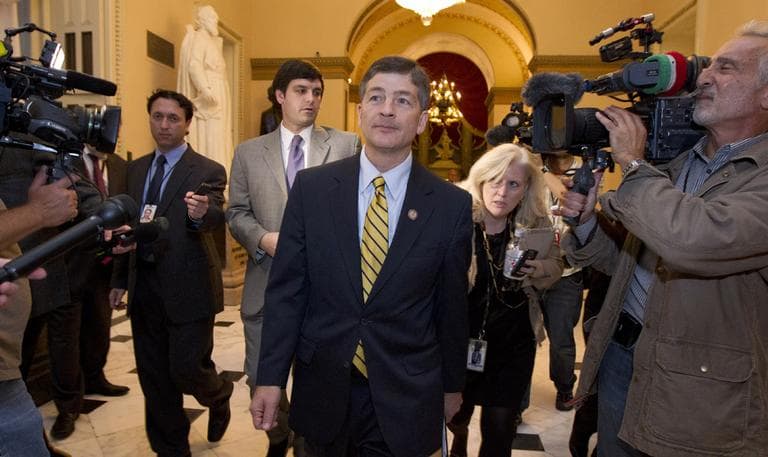Advertisement
Stalemated Debt-Reduction Panel Members Cast Blame

Increasingly gripped by stalemate, Republicans and Democrats on a congressional deficit-reduction supercommittee now seem to be devoting more time to assigning blame than working through the sharp differences that divide them.
Despite small steps in recent weeks toward addressing core solutions to the nation's intractable deficit problem, such as new taxes and curbs on the growth of enormously expensive government benefit programs, both sides said further progress had come to a halt.
Less than a week remains before a Thanksgiving deadline for the panel to vote on a plan cutting deficits by at least $1.2 trillion over a decade. Whatever remaining hope there was appeared to have washed away Wednesday after both Democrats and Republicans on the 12-member panel traded rhetorical salvos about whether the other side was negotiating in good faith.
"We need to find out whether our Republican colleagues want to continue to negotiate or whether they've drawn a hard line in the sand," supercommittee Democratic Rep. Chris Van Hollen of Maryland said. "The question is whether they've kind of said, `Take it or leave it."'
"What I've yet to see is a plan that fundamentally solves the problem," Rep. Jeb Hensarling of Texas, the panel's top Republican, told reporters.
With the talks at a standstill, Democratic officials familiar with the panel's work leaked a nearly week-old secret counteroffer that generally accepted a Republican framework for a $1.5 trillion compromise, while differing on numerous key details.
Democrats signaled a willingness to cut spending by $876 billion, including $225 billion from Medicare and $50 billion from Medicaid, these officials said, and raise tax revenue by $400 billion, far less than they had demanded earlier.
But they also wanted to take $700 billion in savings from winding down the wars in Iraq and Afghanistan to pay for a $300 billion jobs program along the lines President Barack Obama wants, plus take steps to protect the upper middle class from the alternative minimum tax and extend financing for doctors who treat Medicare patients.
The leak of the Democratic offer seemed aimed at rebutting claims by Republicans that Democrats had not responded seriously to a GOP offer last week in which, for the first time, Republicans proposed new tax revenues.
But the $300 billion GOP tax offer was predicated on a fundamental tax overhaul and extension of Bush-era tax cuts set to expire at the end of next year. The Democratic offer would cut off unspecified tax breaks and keep in place current law in which the tax cuts expire, an idea that is anathema to Republicans.
"This particular conversation was a step backwards because it would lock in the largest tax hike in history ... and then add an additional $400 billion in job-killing tax hikes without pro-growth tax reform, plus more than $300 billion in `stimulus' spending," said Michael Steel, spokesman for House Speaker John Boehner, R-Ohio.
If the supercommittee fails to reach a $1.2 trillion deficit-cutting deal by Wednesday, automatic spending cuts totaling that amount would take effect beginning in 2013. That's a result that lawmakers on both sides of the political divide - particularly defense hawks - say they oppose.
The talks turned particularly rocky last week, when Sen. Pat Toomey, R-Pa., presented an offer to several Democrats that envisioned raising almost $300 billion in additional revenue through an overhaul of the tax code that also lowered the top individual tax rate from 35 percent to 28 percent. It would cut the corporate rate as well.
Republicans pointed to the offer as a possible turning point, given the party's long record of opposition to higher taxes.
But Democrats attacked it as a tax cut for the rich in disguise, and the talks seemed to lose momentum.
The secret Democratic counterproposal came from Sen. Patty Murray, D-Wash., according to Democrats, in a meeting Friday with Hensarling.
In it, Democrats suggested raising $400 billion in additional revenue through eliminating tax breaks by means of an overhaul of the IRS code and cutting $876 billion in spending.
Unlike Republicans, who wanted to lock in lower tax rates as part of a plan to raise $250 billion, Democrats said they would find the additional revenue by eliminating loopholes and other existing tax breaks. They also said they would not extend the Bush-era tax breaks due to expire at the end of 2012.
They omitted other parts of the GOP offer, including a proposal to raise the age of Medicare eligibility from 65 to 67 and a different proposal to slow the rise of annual cost-of-living increases under Social Security.
In their offer, Democrats said, Republicans had recommended using the war money, targeting $690 billion to offset the impact of the alternative minimum tax and $19 billion for a short-term extension of Medicare physician payments.
This program aired on November 17, 2011. The audio for this program is not available.